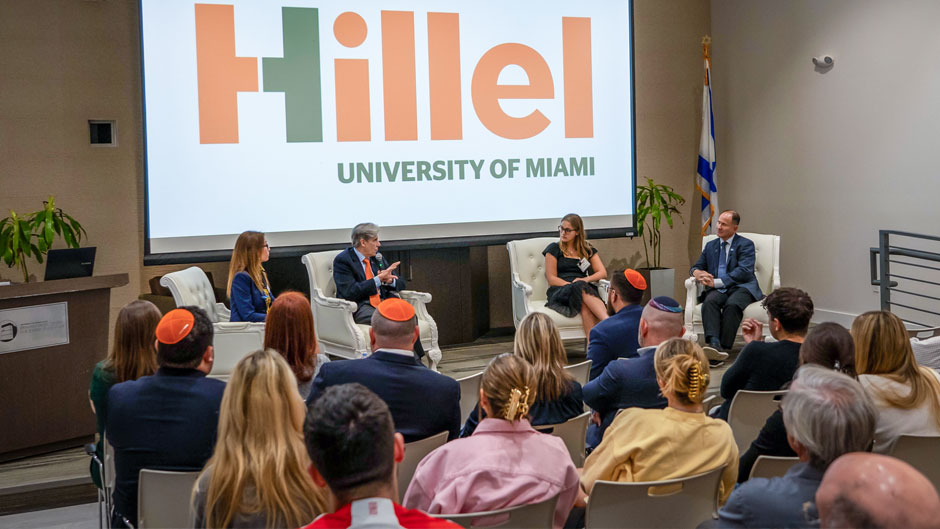As an antidote to the rising antisemitism on many college campuses sparked by conflict in the Middle East, University of Miami President Julio Frenk and Jewish leaders met Tuesday evening to assess the steps the University has taken and should continue to take to ensure safety and maintain a campus climate of open, respectful dialogue.
Frenk, a public health expert and president since 2015, was joined on the panel by Adam Lehman, CEO of Hillel International, and Abi Scholnik, a junior majoring in economics and international studies who is the former co-president of UM Hillel and a member of Hillel International Student Cabinet.
Mycki Ratzan, board chair of UM Hillel and a local attorney, moderated the conversation and, along with the other panelists, lauded Frenk for being among the first university presidents to issue a statement condemning the Oct. 7 attack on Israeli civilians.
“Your leadership speaks to the purpose of this event—to bring our students together with the community so that they know they have support,” said Ratzan. “Your presence here helps strengthen their resolve.”
Frenk emphasized that he acted quickly and exercised an exception to “institutional restraint”—refraining from commenting on occurrences in the public sphere—to prevent the possibility that “a space of silence would be filled by other voices.”
“The attack and targeting of innocent civilians by a terrorist organization violated a foundational value of universities everywhere: to promote knowledge and understanding as a way of resolving complex issues,” said Frenk, emphasizing that he was intentional in his University statement to condemn the violence and express concern for all affected by the violence.
Briana Schwarz, executive director of UM Hillel, welcomed guests, and Frost School of Music student Jake Wild opened the evening singing both the United States and Israeli national anthems. Rabbi Jason Cook offered the “D’var Torah,” the context for the event, reminding the audience that Israel as a nation and a people has long “struggled with matters human and divine.”
To ensure a tolerant campus climate, Frenk highlighted the constraints in place that protect freedom of expression while inhibiting violations, and “a framework of good communication” enhanced by the visibility and accessibility of University leaders. He credited Henry King Stanford, who presided as University president from 1962 to 1981—particularly turbulent years—with establishing the foundation.
“Freedom of expression has clear rules and clear limits,” Frenk said. “Number one: no hate speech, no incitement to violence, and no public display of support to organizations that have been officially declared by our government as terrorist organizations.”
Lehman, whose organization engages 170,000 students across a network of 850 campuses in the U.S. and 16 other countries, noted that universities which were slower in taking a proactive stance regarding the turbulence in the Middle East are now struggling to catch up and contain hate crimes and other incidents of unrest.
“We’ve seen a deterioration of campus climate across the U.S. with incidents—physical assault, hate speech, vandalism—reaching into the thousands,” said Lehman. “The issues are real. Well over half our Jewish students have experienced or witnessed an incident they view as antisemitic.”
Lehman said that it is critical to demonstrate the “three basics”—speaking up, showing up, and standing up.
“It’s not just about University leadership, though we’re so grateful to this one that has stepped up,” he said. “It’s on us, too, our ability as a community supported by lay leadership and supported by the broader community. It’s wonderful to see representatives from the [Greater Miami Jewish] Federation here.”
Still, the bar to speak up, show up, and stand up needs to be so much higher, he pointed out.
“We need universities to discipline individual students who are crossing the line in ways that are threatening and endangering other students,” said Lehman. “It shouldn’t be so hard, but it obviously is in terms of how many universities are not showing up in this moment.”
Scholnik, originally from Argentina, noted that half her family is still in Israel and that the past weeks have been horrific.
“It’s been really hard for us, yet having Hillel as a safe home, a safe place has been so important,” she said. As a member of the International Student Cabinet, Scholnik actively promotes Hillel’s perspectives on social media to the point that she is sometimes referred to as “the Hillel girl”—a moniker that has made her a special target for vitriol.
Ratzan asked how better bridges might be built with non-Jewish groups on campus to serve as better allies.
“We’re all human and have the same need to create relationships where we’re genuine, we’re friends, and where we need to learn more about each other,” Scholnik replied. “The way we tackle this is through our humanity. Yet it’s hard to do, a slow process that we need to do actively,” he added.
“Finding humanity in everyone is going to help going forward, especially while we’re seeing all this anti-Jewish rhetoric—it’s so dehumanizing,” Scholnik continued. “Yet slowly, but surely, we can connect, at least at UM, connecting small groups of people.”
Lehman acknowledged that the past few weeks of following the horrific attacks, the ongoing conflict, and the rise of antisemitism have been an incredible struggle in the worst way “wherever you are in your life’s journey.”
“Yet, I have seen remarkable leadership, so many student leaders who say, ‘I want to lead, I want to make a positive difference,’ ” Lehman said. “Every day I get to be inspired by professionals who give their heart and soul to support students.
“We are on the precipice of a brighter Jewish future, a brighter academic and higher education era,” Lehman continued. “This exposed what we need to fix and we do repair. This is our moment, and I couldn’t be more inspired in terms of the capacity of the people here and across our communities to get that done.”
